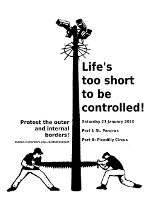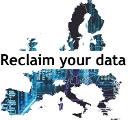 Events and protest against the 13th European Police Congress
Events and protest against the 13th European Police Congress
In 2010 the European Police Congress, a meeting of international police functionaries, politicians and various actors of the security industry, is again going to take place in Berlin. It is the 13th convention and just like the Congress on European Security & Defence, it is being organised by the publishing group "Behörden Spiegel". According to the organisers, last years convention was visited by 1800 participants from 70 countries.
Double Networking
As officially stated, the convention aims at "reinforcing existent relationships and developing new practices". The focal point is the expansion and consolidation of the cooperation of European repressive institutions, whose agenda is concerned with an "EU Internal Security Strategy". On the schedule is the "Stockholm Programme", a "multi-annual" programme on the future of European home affairs. This five year programme again calls for a "war on terrorism, organised crime and illegal migration", at the same time demanding the expansion of police, military and intelligence service cooperation. This encompasses the adoption of new technological standards for surveillance and control, for which the security industry will exhibit various products in the congress lounge.
The police congress wants to be "trendsetting" for the embedding of intelligence service methods into police procedures. Surveillance and repression increasingly operates "proactive", an in the police forces jargon common synonym for an "anticipatory approach", which has also been adopted by the NATO. During the police congress there will be diverse forums in which strategies are being put together to "fuse inner and outer security". Accordingly one panel poses itself the question "What can we learn from the armed forces?” Representatives of the NATO meet with police officials and intelligence agents, interior ministers and state secretaries go for coffee with security industry CEO’s at their stalls. Last year a podium talk on civil-military cooperation was given by Kai Vittrup, the chief of the EU police mission in Afghanistan. Vittrup has been chief of the UN police forces in the Kosovo as well as before being involved in leading policing positions in Sudan, Iraq and East-Timor. For years he has been chief of the police in Copenhagen, which only recently at the climate summit demonstrated how the policing of protest and resistance shall take place in the future to come.
 Press Release 28 January, 2010, London NoBorders
Press Release 28 January, 2010, London NoBorders
 No borders, no nations!
No borders, no nations!






